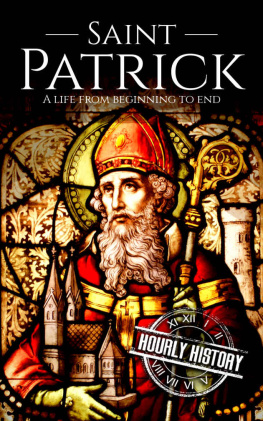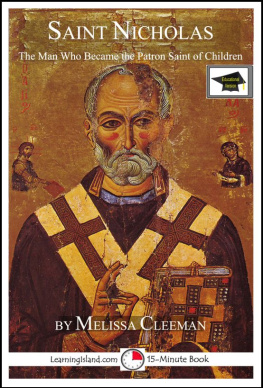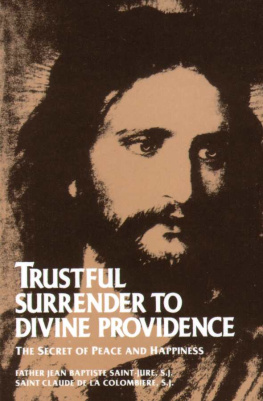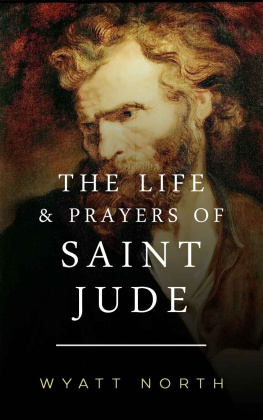St. Gerard Majella
1726-1755
Lay Brother of the Congregation
of the Most Holy Redeemer
| Imprimi Potest: | William G. Licking, C.SS.R.
Provincial
Baltimore
Feast of St. Gerard [Oct. 16], 1907 |
| Nihil Obstat: |  Patrick J. Supple Patrick J. Supple
Censor Librorum |
| Imprimatur: | William Henry [OConnell]
Archbishop of Boston
Boston |
Published c. 1907 by Mission Church Press, Boston, Massachusetts under the title: The Wonder-Worker of Our DaysThe Life, Virtues, and Miracles of St. Gerard Majella, Lay-Brother of the Congregation of the Most Holy Redeemer . Reproduced complete and unabridged from the Second Edition, with slight modernization of words and improvements in translation.
Copyright 1999 by TAN Books, an Imprint of Saint Benedict Press, LLC.
Library of Congress Catalog Card No.: 98-61400
ISBN 978-0-89555-630-1t
Printed and bound in the United States of America.
TAN Books
Charlotte, North Carolina
2012
To the honor of the Most Holy and Undivided Trinity, for the exaltation of the Catholic Faith and for the spread of the Christian Religion, by the authority of Our Lord Jesus Christ, of the Blessed Apostles Peter and Paul and by Our own We define and declare the Blessed Confessors Gerard Majella and Alexander Sauli to be Saints, and We enroll them in the catalogue of Saints
December 11, 1904

St. Gerard, pray for us.
PUBLISHERS PREFACE
The incredible life of St. Gerard Majella has been a great inspiration to the entire Catholic Church for over 200 years, and yet his story may cause some readers to become discouraged about their own salvation. But this should not be.
As with so many great and notable Saints in the history of the Catholic Church, St. Gerard Majella is believed never to have committed a mortal sin; in fact, his spiritual advisers could not detect that he had ever committed even a venial sin. Undoubtedly, this level of sanctity was the basis for the many miracles that he worked during life, and even after death.
And yet we read in Father Saint-Omers life of the Saint that he often had periods of great spiritual darkness, and even came close to despairing of his salvation. This fact could easily lead the reader to discouragement, for if St. Gerard, who was so very good, had periods of darkness, even to the point of despair, what about the vast majority of us, who are nowhere near so good, who oftentimes fall into sin, who perhaps even commit mortal sin, or who have in the past lived in mortal sin? Should not we be the ones inclined to despair? If one who was so obviously holy and blessed by Almighty God was worried about his salvation, what chance do we have? might well be our question.
An attitude of concern, of course, is typical of all who are truly on the road to salvation. St. Peter, no less, gives us the clue to this seeming paradox of sanctity combined with concern when he says, If the just man shall scarcely be saved, where shall the ungodly and the sinner appear? ( 1 Peter 4:18). In other words, if those true Christians who are avoiding mortal sin and who are striving for Heaven shall barely be saved, what about a ) the open sinners, who knowingly and blithely (it would seem) commit mortal sin, and b ) the ungodly, who have no real concern for their salvation and who mainly pursue worldly goals? Where shall they appear? The point is that people living without the light of the Gospel of Jesus Christ are in darkness about their eternal salvation. Even regarding Catholics, the Cur of Ars could say, Some people are so profoundly ignorant that they do not recognize a quarter of their ordinary sins.
This failure to recognize our sins arises from the spiritual darkness caused, on the one hand, by Original Sin, and on the other, by our own personal sins. When a person begins really to live by the teachings of Our Lord and to strive for perfection, there occur as a consequence moments wherein his mind penetrates the veil of this darkness, and in that spiritual insight, he perceivesif only for a brief timethe precarious state of mans salvation, that we have all sinned and do need the glory of God. ( Rom . 3:23). Such periodic moments of clear insight can cause us almost to despair, as St. Gerard nearly did on a number of occasions.
Far from causing us to despair, however, these moments of spiritual luciditywherein we perceive our great dangershould cause us joy. For as Holy Scripture repeats in several places, The fear of the Lord is the beginning of wisdom. ( Psalm 110:10; cf. also Prov. 15:33; Eccles. 1:20, 22, 25, 34; 19:18). St. Paul tells us, With fear and trembling work out your salvation. ( Phil. 2:12). When once we who are earnestly striving for salvation become concerned and fearful, this means that the scales of blindness covering our spiritual insight are falling away and we are starting to see our situation as it really is vis-a-vis pleasing God and attaining our salvation! And the prospect is frightening, because we find ourselves, especially in our inclinations and motives, to be far from really good. All the greatest Saints had this perception, and they were humble as a result, for they could see their own weaknesses and shortcomings. That is the reason, when one starts to receive this insight, that confidence in God becomes such a necessary virtue.
The life of St. Gerard Majella throws these realities about the spiritual life into sharp focus. On the one hand, he was so good and worked so many miracles, and on the other, he was so profoundly concerned about his own salvation. Reading about this concern of his, one could say to himself, Whats the use? If St. Gerard had such trouble, I will never make it! But that is exactly the wrong reaction. Why?
First of all, we must distinguish between ordinary and extraordinary Saints. You and I, probably, and most of us, are called to be ordinary Saints, people who work out our salvation pretty much in obscurity and, when we pass from this life, are forgotten by all save a few close loved ones. Extraordinary Saints are generally called by God to do some extraordinary work or to have their holiness manifested to the world as a great inspiration to others. St. Gerard, obviously, was an extraordinary Saint. The number of extraordinary Saints is relatively small, compared to the number who live in obscurity. But this does not mean that you and I cannot achieve great sanctity and find a high place in Heaven.
Sanctity depends on our interior state, upon the degree of our love of God, upon uniformity with His holy Will and upon the purity of our motives. Indeed, if we are so blessed as to gain Heaven, we shall likely find there in the highest places many who were obscure mothers and fathers and other lay people in this life.
St. Therese the Little Flower stands in both campsordinary and extraordinary. In life, her sanctity was unknown to the world, unknown even to many of the nuns in her Carmelite convent. But it was not unknown to her own sisters, who, after her death, helped make her known to the world. She was so tremendous that Pope St. Pius X could exclaim that she is the greatest Saint of modern timesshe, a totally unknown nun who died at 24 and of whom a fellow sister commented to the effect: What shall we ever find to say about Sr. Therese of the Child Jesus in our announcement of her death to the other Carmelite convents? Now the whole world knows her. (Just ask her for a favor!)










 Patrick J. Supple
Patrick J. Supple